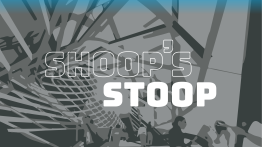Shoop's Stoop - June 2022 Newsletter
POSTED ON: June 23, 2022

Welcome back to Shoop’s Stoop! We successfully completed yet another academic year and I want to share some of the exciting things that happened in the Albert Nerken School of Engineering since our last update.
This year we had a total of 92 undergraduate and 42 graduate students graduate from the School of Engineering. For our undergraduates, this included 23 Chemical Engineers, 18 Civil Engineers, 31 Electrical Engineers, 16 Mechanical Engineers, and 4 General Engineers. In addition to the undergraduate degrees, members of this graduating class were awarded a total of 45 minors: 6 Math Minors, 22 Computer Science Minors, 11 Bioengineering Minors, and 6 HSS Minors.
Our fall 2022 incoming first-year class is again very strong. We admitted 123 students into the Class of 2026. There will be 27 students majoring in Chemical Engineering, 31 in Civil, 31 in Electrical, 25 in Mechanical, and 9 in General Engineering. Women comprise 50% of this class … let me say that again … WOMEN COMPRISE 50% OF THIS CLASS! Additionally, 11% of this class identify as underrepresented minorities, 22% self-identified as the first in their family to attend college and 7% of the class is international. Qualitatively, this class includes students who have conducted research in quantum computing and bioengineering, filed a patent at the NIH, and performed at Carnegie Hall. They are builders, inventors, and problem-solvers: from designing a guitar that changes colors depending on the sound waves' frequency to building a bike-powered washing machine to designing a prosthetic arm. They are competitors in chess, debate, badminton, soccer, e-sports, and robotics. This class is community-driven and seeks to make an impact by volunteering as EMTs and junior firefighters, interning for city and state representatives, working in nursing homes, and making PPE for frontline workers during the pandemic. In their applications, students shared deep discussions around clean energy and sustainability, the pandemic, and thoughtful conversations around diversity, equity, and inclusion, particularly related to STEM.
Our students continue to be amazing. Our students Naomi Akiyama ChE’23 and Caitlin Noonan ChE’25 took 1st Place at the AlChE Mid-Atlantic Regional Undergraduate Research Competition, our Solar Decathlon Team won the Excellence in Industry Engagement Award at the U.S. Department of Energy Solar Decathlon 2022 Design Challenge Competition, Faith Lin EE’24 was selected for State Department Information Technology Fellowship, Lionel Gilliar-Schoenenberger CE’23 and Qasim Akhlaq CE’23 Awarded Moles Scholarship, and our Intelligent Ground Vehicle Competition (IGVC) Team received the Rookie of the Year award and placed 4th for Self-Drive performance and 5th for Self-Drive design in the 29th Annual IGVC Competition. Read more about each of these in this newsletter.
In fall 2022, we will add another new tenure-track faculty member to our ranks. Brittany Corn-Agostini will join the Department of Physics as an Assistant Professor. She holds a Ph.D. in physics from Stevens Institute of Technology, has 10-years of industry experience in the financial sector and her area of specialization is in quantum mechanics. With Brittany’s addition, we will have added eight new tenure-track faculty to the full-time faculty in the School of Engineering. In September, we will begin a search for a civil engineering tenure-track faculty member.
This summer we will have five faculty members attend the 2022 Institute on Project-Based Learning, June 21-24, 2022 at Worcester Polytechnic Institute. Professors David Wootton, Michelle Rosen, J.B. Koo, Sven Haverkamp, and Michael Giglia comprise the Cooper Union team.
In addition, this summer we have seven full-time faculty members representing each of our four ABET degree-granting majors collaborating on a project to reimage the interdisciplinary capstone experience. This group is investigating the possibility of developing interdisciplinary capstone projects that incorporate students and faculty from more than one engineering discipline. This approach more closely models industry where engineers are expected to work collaboratively with experts in several different technical and non-technical domains. The faculty team are investigating the feasibility of introducing interdisciplinary capstone projects at the Cooper Union and are developing a prototype for an interdisciplinary capstone course that can be piloted during Academic Year 2023. Topics to be addressed during this summer’s effort include but are not limited to benchmarking of best practices of multidisciplinary and interdisciplinary capstone design and implementation; the practical extent of the interdisciplinarity; faculty participation model that ensures faculty engagement from the multiple disciplines participating; integration of project management, ethics, teamwork, group dynamics, and other professional skills; course objectives; course scheduling; assessment; and possible industry engagement.
Thank you again for sharing your valuable time with me on Shoop’s Stoop! You should know that these are just a few of the highlights – the tips of the waves – of activities in the School of Engineering. It’s an exciting time to be part of the Albert Nerken School of Engineering. I look forward to sharing additional updates in future editions of Shoop’s Stoop!

Barry L. Shoop, Ph.D., P.E. | Dean of Engineering | Albert Nerken School of Engineering




